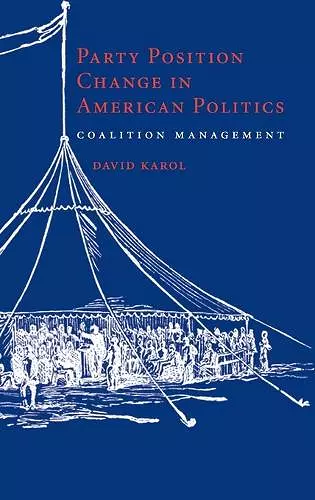Party Position Change in American Politics
Coalition Management
Format:Hardback
Publisher:Cambridge University Press
Published:23rd Nov '09
Currently unavailable, and unfortunately no date known when it will be back
This hardback is available in another edition too:
- Paperback£28.99(9780521738194)

In this book David Karol explains important variations in party position change, enhancing our understanding of parties, interest groups, and representation.
David Karol views parties as coalitions of groups with intense preferences on particular issues managed by politicians. He explains important variations in party position change: the speed of shifts, the stability of new positions, and the extent to which change occurs via adaptation by incumbents.America's two party system is highly stable, but its parties' issue positions are not. Democrats and Republicans have changed sides on many subjects, including trade, civil rights, defense spending, and fiscal policy, and polarized on newer issues like abortion and gun control. Yet party position change remains poorly understood. In this book David Karol views parties as coalitions of groups with intense preferences on particular issues managed by politicians. He explains important variations in party position change: the speed of shifts, the stability of new positions, and the extent to which change occurs via adaptation by incumbents. Karol shows that the key question is whether parties are reacting to changed preferences of coalition components, incorporating new constituencies, or experimenting on 'groupless' issues. He reveals that adaptation by incumbents is a far greater source of change than previously recognized. This study enhances our understanding of parties, interest groups, and representation.
'We often think of the long-term stability in the positions that the parties take on major issues. Changes, when they come, are supposed to be associated with major events, perhaps realignments. And yet, as Karol shows, there is more change than that. Not only that, but, as he shows, there are three different paths, with different dynamics and speeds of adjustment, the latter largely due to the role of 'interest coalitions'. Karol demonstrates his claims through careful study of a number of particular issues, showing, inter alia, that what we think of as left and as right, as Democrat and Republican is a function of parties, leaders, and interests, all of which change over time. And, in this, we learn not only much about American politics but about the limits of our scholarly understandings and the theories that lie behind them.' John Aldrich, Duke University
'David Karol's new book tackles the thorny issue of why and how parties change positions on issues. This is a topic we know far too little about. Karol corrects this situation by gathering an impressive array of evidence and thinking through many of the difficult theoretical issues that confront this tricky subject. By so doing, he advances our understanding of interest groups, political parties, and representation. It is a book I recommend to anyone interested in the study of party politics.' John G. Geer, Vanderbilt University
'Karol's insightful book begins by reminding us that the two U.S. political parties have completely reversed their positions over time on such weighty issues as civil rights, trade, and fiscal policy. His original explanation emphasizes coalitional negotiations between organizations, voters, politicians, and party leaders. Not only do those negotiations require shifts in party policy, they require leading politicians to change their own policy positions in response. Karol's account of the timely and dramatic conversions of leading politicians on abortion and civil rights makes for fascinating reading.' Gary Miller, Washington University, St. Louis
ISBN: 9780521517164
Dimensions: 234mm x 157mm x 25mm
Weight: 560g
328 pages